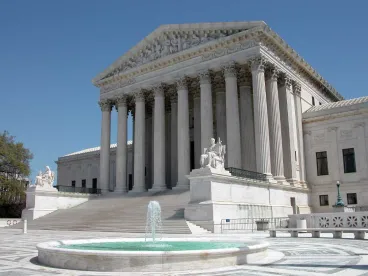The US Supreme Court has settled the question of whether an interlocutory appeal of the denial of a motion to compel arbitration pursuant to Section 16(a) of the Federal Arbitration Act (FAA)1 automatically stays the district court proceedings. In a highly anticipated 5–4 decision, the Court ruled that it does. Justice Kavanagh’s succinct opinion in Coinbase, Inc. v. Bielski lays out what he calls the majority’s “common sense” holding, which resolved a decades-long circuit split.2
Background
In 1988, Congress amended the FAA to give parties the immediate right to appeal the denial of a motion to compel arbitration.3 The statute, however, is silent as to whether the appeal automatically stays the district court proceedings. In the years following the 1988 amendment, a circuit split arose regarding that question. The Ninth Circuit, along with the Second and Fifth Circuits, historically left the decision to stay district court proceedings to the trial court’s discretion, holding that a case may proceed, even to trial, while the appellate court considers whether the matter should have been sent to arbitration.4 Six other circuit courts, however, recognized a mandatory stay rule in this same situation.5
In Bielski, the plaintiffs filed two separate class actions in the US District Court for the Northern District of California. Coinbase’s User Agreement provides for dispute resolution via binding arbitration, so Coinbase moved in each case to compel arbitration, which the district court denied.6 Coinbase, pursuant to FAA Section 16(a), exercised its right to appeal immediately whether the case should proceed in arbitration, but both the district court and the US Court of Appeals for the Ninth Circuit refused to stay the proceedings while the appeals were pending.7 The US Supreme Court granted certiorari to determine whether the district court proceedings ought to have been stayed pending the plaintiffs’ interlocutory appeals, and to resolve more generally the split among the circuits over the question of a mandatory stay rule.8
US Supreme Court Decision
The question before the Supreme Court was straightforward: When a district court denies a party’s motion to compel arbitration, and that party takes an interlocutory appeal of that denial pursuant to FAA Section 16(a), must the district court stay its proceedings pending resolution of that interlocutory appeal?9
“The answer is yes[,]” writes Justice Kavanagh for the majority.10 “Congress enacted § 16(a) against a clear background principle prescribed by this Court’s precedents: An appeal, including an interlocutory appeal, ‘divests the district court of its control over those aspects of the case involved in the appeal.’”11 The decision is based on Griggs v. Provident Consumer Discount Co.—a Supreme Court decision from 1982—which the Court concludes “resolves this case.”12 Applying Griggs to the present case, the Court explains that “[b]ecause the question on appeal is whether the case belongs in arbitration or instead in the district court, the entire case is essentially ‘involved in the appeal[,]’” and therefore the district court must stay its proceedings until the appeal is concluded.13 The Court further opines that to hold otherwise would nullify the statutory right under FAA Section 16(a) to take an interlocutory appeal, and would prevent the parties from realizing the recognized benefits of arbitration—efficiency, lower costs, less intrusive discovery.14
In addressing the fact that FAA Section 16(a) is silent as to a mandatory stay, the Court holds that “[w]hen Congress wants to authorize an interlocutory appeal and to automatically stay the district court proceedings during that appeal, Congress need not say anything about a stay.”15 In other words, Congress need only make clear when it wants to authorize an interlocutory appeal but not an automatic stay of district court proceedings; in the inverse situation, the Court explains, it is “Congress’s longstanding practice” to remain silent.16
Justice Jackson's Dissent
Justice Ketanji Brown Jackson, dissenting, objects that the majority’s “mandatory-general-stay rule for interlocutory arbitrability appeals comes out of nowhere” and is tantamount to the Supreme Court putting its thumb on the scale in favor of “defendants seeking arbitration.”17 Justice Jackson challenges the majority’s reliance upon the Griggs principle, which she argues is actually much narrower than the majority represents, and contends that historically there is more support for leaving the decision of whether to stay district court proceedings within the discretionary judgment of the district court judge.18
She also opines that the traditional factors used in disposing of a motion to stay—likelihood of success on the merits, irreparable harm, favorable balance of equities, and alignment with the public interest—are sufficient to justify granting most non-frivolous motions to stay; the majority’s mandatory stay rule, therefore, is intended to benefit those cases “in which a stay is not warranted under the usual discretionary standard.”19 The dissent further notes that granting such a benefit for the “pro-arbitration party” in every case is Congress’s prerogative, not the judiciary’s.20
The dissent concludes with a warning that the Court’s holding could have a “destabilizing” effect on federal litigation, particularly if lower courts follow the majority’s logic and apply the mandatory stay rule to other interlocutory appeals arising from proper forum disputes, such as disputes over forum selection clauses, venue, personal jurisdiction, forum non conveniens, federal jurisdiction, and abstention.21
Justices Kagan and Sotomayor joined the dissent, and Justice Thomas joined the dissent in part; none wrote separately.
The Court’s decision in Bielski settles the question of a mandatory stay in the context of an appeal under the FAA Section 16(a). Aside from pronouncing the blanket mandatory stay rule, however, the majority and dissenting opinions are notable for their discussions of the judiciary’s power in the face of Congressional silence. The majority justifies its holding by arguing that, because Congress was silent in Section 16(a) of the FAA on whether district court proceedings should be stayed, the judiciary may step in and create the mandatory stay rule.22 The dissent interprets Congress’s silence in the opposite way, arguing that because Congress was silent when it could have authorized a mandatory stay, the judiciary’s creation of the mandatory stay rule is an intrusion upon Congress’s power.23 These differing interpretations of Congressional silence may have implications for future statutory interpretation at the Supreme Court. It is also likely that litigants will seek to explore the limits of the dissent’s concern regarding the “destabilizing” effect on federal litigation by seeking mandatory stays in other interlocutory appeals arising from forum or jurisdiction disputes.
FOOTNOTES
1 9 U.S.C. §§ 1 et seq.
2 Coinbase, Inc. v. Bielski, 599 U.S. ____, 2, 5 (2023).
3 9 U.S.C. § 16(a).
4 Bielski, 599 U.S. at 13 n.4 (Jackson, J., dissenting).
5 Id. at 2, 4 n.3.
6 Id. at 1.
7 Id. at 2.
8 Id.
9 Id. at 3.
10 Id.
11 Id.
12 459 U.S. 56, 58 (1982); see also Bielski, 599 U.S. at 3.
13 Bielski, 599 U.S. at 3–4.
14 Id. at 5–6.
15 Id. at 6–7.
16 See id.
17 Id. at 1 (Jackson, J., dissenting).
18 Id. at 5–7, 8–11 (Jackson, J., dissenting).
19 Id. at 11 (Jackson, J., dissenting) (emphasis added).
20 Id. at 13 (Jackson, J., dissenting).
21 Id. at 14–15 (Jackson, J., dissenting).
22 Id. at 6–7, 7 n.6.
23 Id. at 3 n.1 (Jackson, J., dissenting).







 />i
/>i

